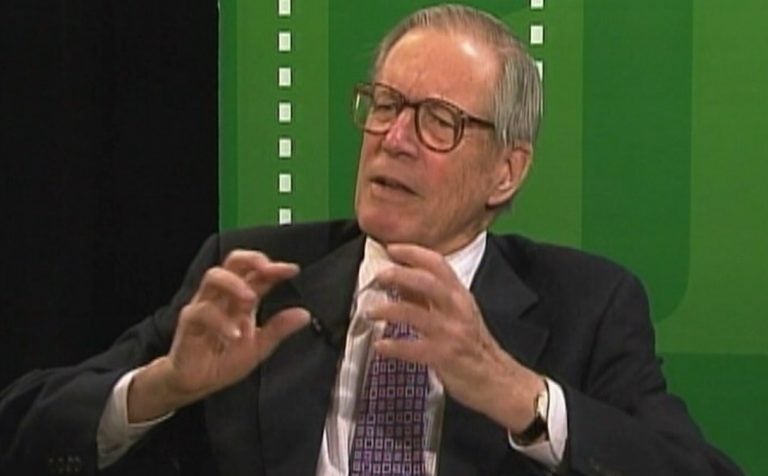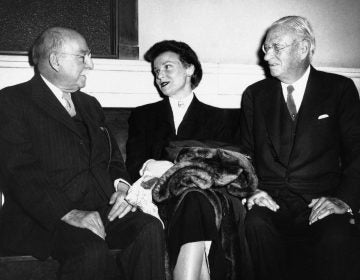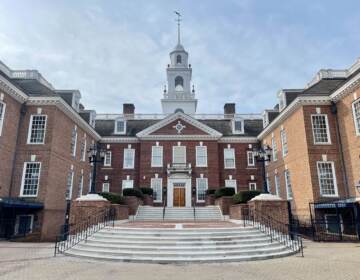Pete du Pont’s financial legacy in Delaware
Here’s how former Gov. Pierre S. “Pete” du Pont cemented his legacy and uprighted Delaware’s sinking economy in the late 70s and early 80s.

Former Delaware Gov. Pierre S. “Pete” du Pont speaks during an interview with WHYY in 2011. Du Pont died at his Wilmington over the weekend after a long illness. He was 86 years old. (File/WHYY)
Members of the du Pont family have been making their mark on Delaware for more than 200 years.
Whether it’s Eleuthère Irénée du Pont’s gunpowder mills that eventually became the multi-billion dollar global DuPont Company, or T. Coleman du Pont creating the nation’s first highway that runs the length of Delaware, the du Pont name is synonymous with the state’s history.
And right up there at the top of the list of this uber-influential family must be former Gov. Pierre S. “Pete” du Pont.
Du Pont died at his home in Wilmington over the weekend after a long illness. He was 86 years old.
While E.I. du Pont may have had a bigger global impact through his powder mill company-turned chemical/science behemoth, Pete du Pont’s impact on helping stabilize Delaware’s economy can’t be matched.
Delaware’s 68th governor transformed the state’s economy via the Financial Center Development Act, which made Delaware a major hub for credit card giants and the financial services industry. At the height of the industry’s growth, more than 40,000 people were employed as a result.
And as tributes have poured in from around the political world describing his influence, we turn back the clock 10 years to hear from du Pont himself.
In a 2011 interview with WHYY News, he talked about the effort to bring Delaware back from the brink of economic disaster. He says it’s what he was most proud of accomplishing as governor.
“We tried to move decision-making away from the people in the legislature and the governor’s office out so that the public could participate in it,” he said. “Previous governors used to have a few legislators in their office and shut the door, loosen their ties, and write up a budget that looked good. We decided what we needed to do was establish a DEFAC [Delaware Economic and Financial Advisory Council to] do their job in public.”
The council made up of lawmakers, business leaders, and regular citizens formed to hash out how much revenue the state was expecting so lawmakers and the public could get an inside view of the budgeting process.
Still today, DEFAC holds public meetings several times a year to discuss state revenue and give lawmakers an estimate of how much money they’ll have to work with as they craft the budget.
“Their job in the public was to raise their hands and vote on how much gasoline tax was going to bring in and how much the income tax was going to bring in. So all of a sudden it was out there and people had to do it,” du Pont said.
Du Pont also limited state spending to 98% of the revenue set by DEFAC. That helped the state create a “rainy day fund” available to tap into during economic downturns.
It was an economic downturn that was his trial by fire when he first took the governor’s office in 1977. After serving three terms in the U.S. House as Delaware’s lone representative there, du Pont was elected governor as the state faced several years of deficits despite having the highest tax rate of any state in the nation at the time.
He slashed the tax rate and vetoed the state budget overspending he deemed out of control. Even though the General Assembly overturned the veto, du Pont said it was the starting point for better cooperation.
“After they saw that, they decided that we better do something together. And then we really started to do all the work to get the spending under control and get things straightened out,” he said.
As the state’s finances got “straightened out” in Dover, the Delaware economy showed signs of life. By 1982, while the nation suffered through the recession, Delaware employment grew 3%. In FY 1977, the last year before du Pont took office, the state had to pass 37 supplemental appropriation measures to pay the bills. By the FY 1983 budget, the DEFAC process of evaluating revenue and budget planning was so successful that no supplemental appropriations were needed.
Delaware’s budget has been balanced every year since FY 1978.
“Pete du Pont cared deeply about his state and country, and his sense of duty and level of dedication were self-evident during a long career in public service,” said U.S. Sen. Chris Coons of Delaware. “Pete labored tirelessly to strengthen our state finances, and he knew the importance of bringing businesses to Delaware.”
U.S. Sen. Tom Carper was elected state treasurer the same year du Pont was elected governor. He says Delaware is a better place today because of him.
“We came together — a Republican governor, Democratic State Treasurer, and the Democratic and Republican leadership in the legislature — and eventually put into place reforms that continue to serve our state well today,” Carper said. “Pete knew that one of the best things you can do to help someone is help them get a job, so he was very focused on creating a nurturing environment for job growth and job preservation as governor.”
Due to the coronavirus pandemic, a memorial service for du Pont will be held at a later date still to be determined.

Get daily updates from WHYY News!
WHYY is your source for fact-based, in-depth journalism and information. As a nonprofit organization, we rely on financial support from readers like you. Please give today.







